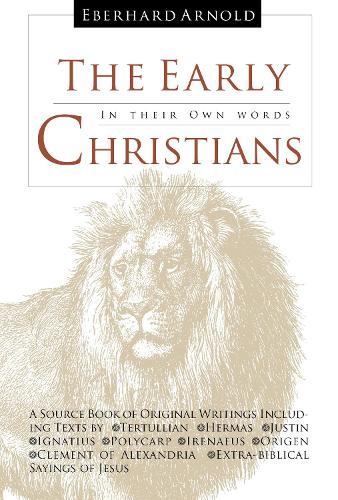
The Early Christians: In Their Own Words
(Hardback)
Publishing Details
The Early Christians: In Their Own Words
By (Author) Eberhard Arnold
By (author) Tertullian
By (author) Hermas
By (author) Justin
By (author) Ignatius
By (author) Polycarp
By (author) Irenaeus
By (author) Origen
By (author) Clement of Alexandria
Plough Publishing House
Plough Publishing House
2nd September 2014
United States
Classifications
General
Non Fiction
History of religion
Religion and politics
Religious intolerance, persecution and conflict
Christian life and practice
Relationships and families: advice, topics and issues
Christianity
Religious instruction
Parenting, parenthood: advice, topics and issues
Physical Properties
Hardback
379
Width 152mm, Height 228mm, Spine 38mm
680g
Description
In these firsthand accounts of the early church, the spirit of Pentecost burns with prophetic force through the fog enveloping the modern church. A clear and vibrant faith lives on in these writings, providing a guide for Christians today. Its stark simplicity and revolutionary fervor will stun those lulled by conventional Christianity. The Early Christians is a topically arranged collection of primary sources. It includes extra-biblical sayings of Jesus and excerpts from Origen, Tertullian, Polycarp, Clement of Alexandria, Justin, Irenaeus, Hermas, Ignatius, and others. Equally revealing material from pagan contemporaries - critics, detractors, and persecutors - is included as well.
Reviews
This welcome anthology of writings from the first two centuries of Christendom is full and practical and fervent. -- America Magazine
If you hold, like Arnold does, that Christianity is no longer Christianity if it departs too radically from its beginnings, you must read this book. -- Roland H. Bainton,Professor Emeritus, Yale University
This selection will not only help readers understand early Christianity intellectually; it will also challenge them to live more fully, abundantly, and even radically. -- Justo L. Gonzalez,Emory University
A compelling, fascinating, and direct account of one of the most important periods in the history of modern man. -- James Luther, AdamsHarvard Divinity School
Author Bio
Eberhard Arnold (18831935) studied theology, philosophy, and education and was widely sought as a speaker at student conferences and other gatherings. In 1920, leaving a promising career as a writer and the privileges of upper-middle- class life in Berlin, he moved with his wife and children to Sannerz, a small village in central Germany, where they founded a Christian community on the basis of the Sermon on the Mount.
